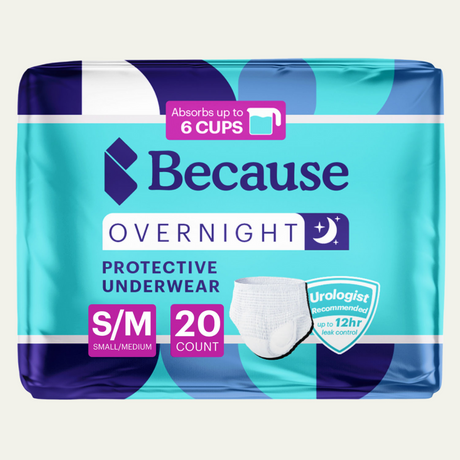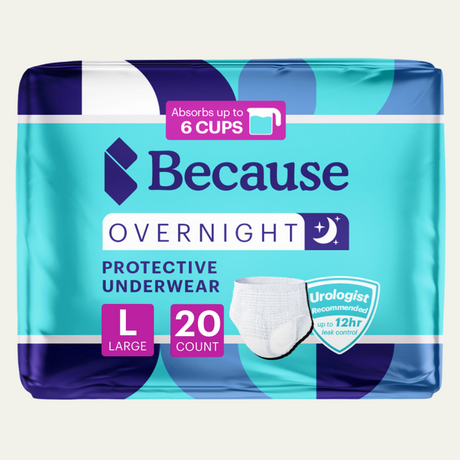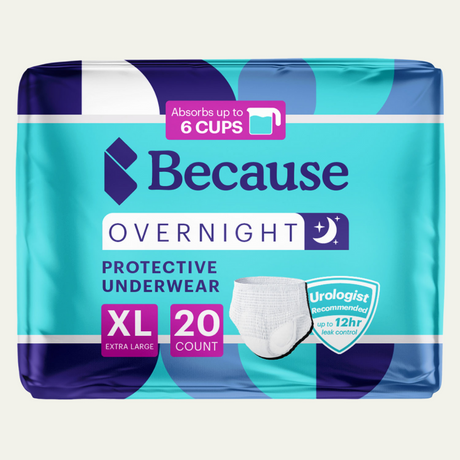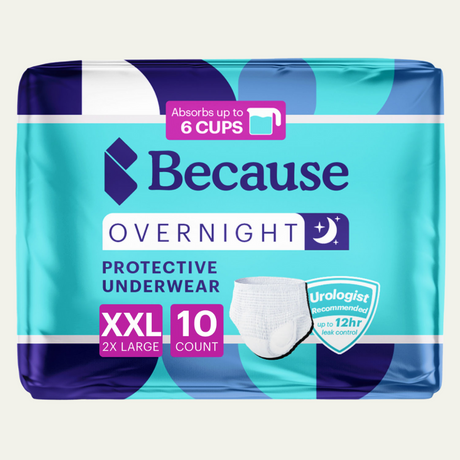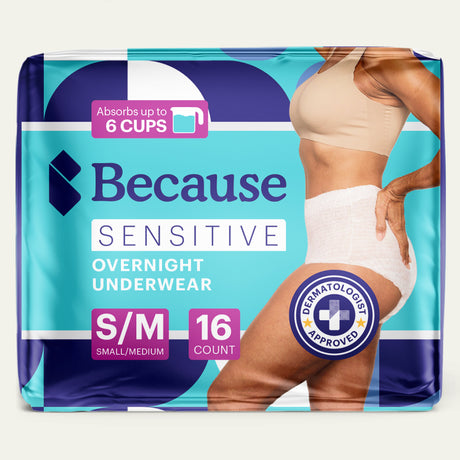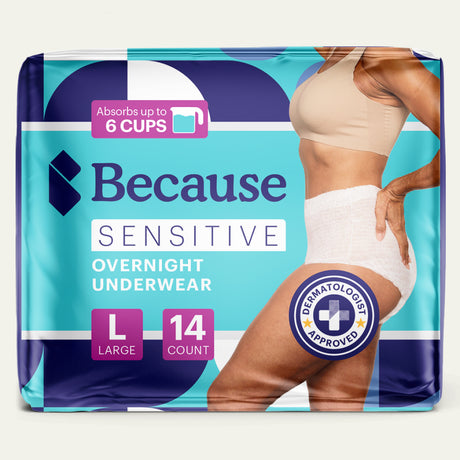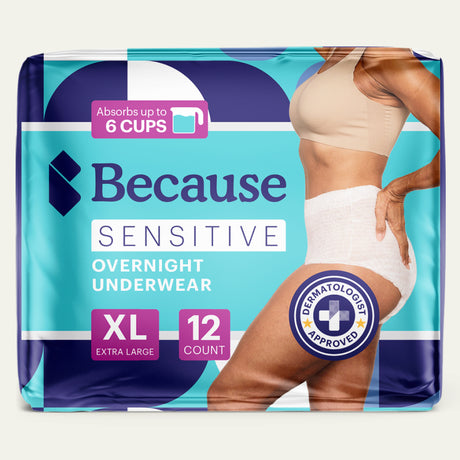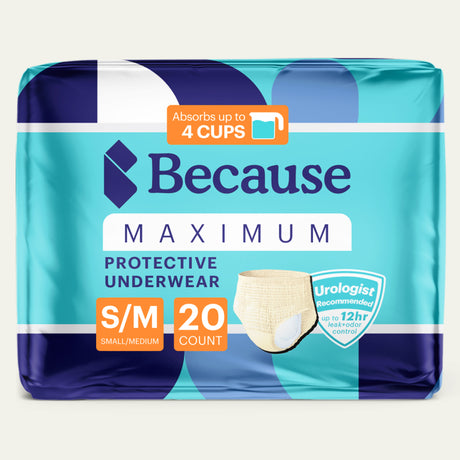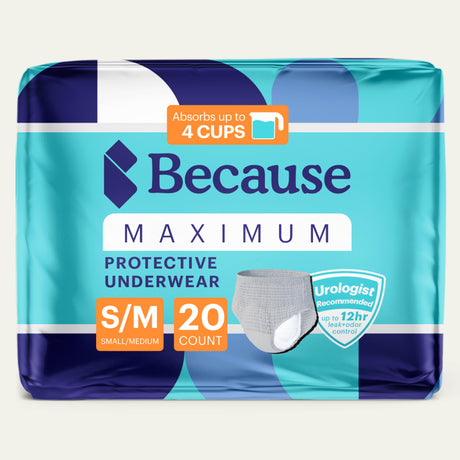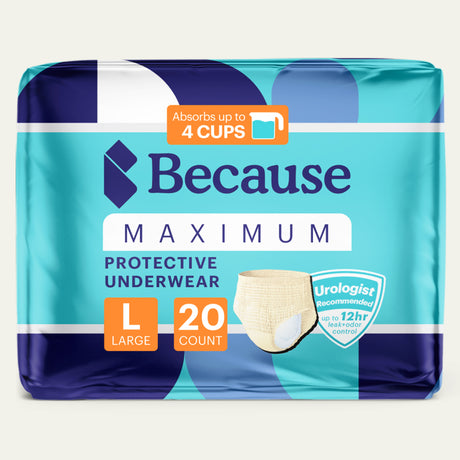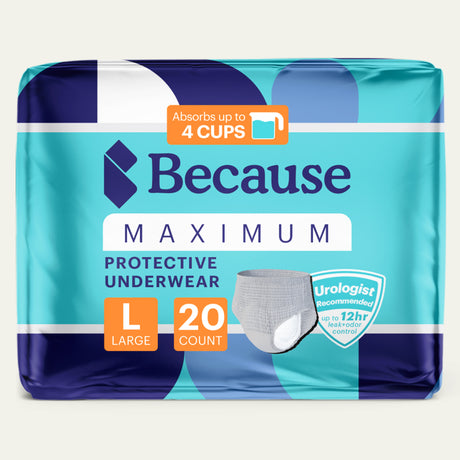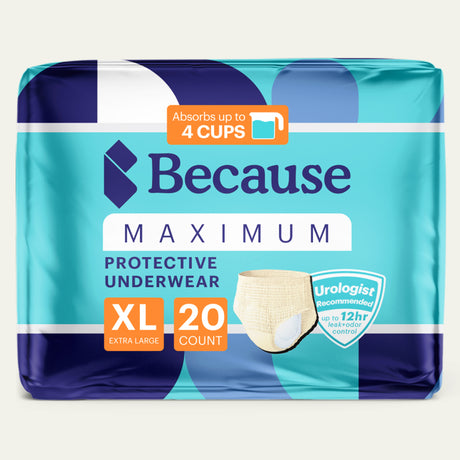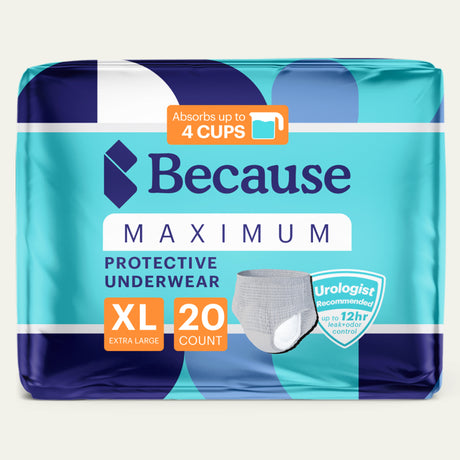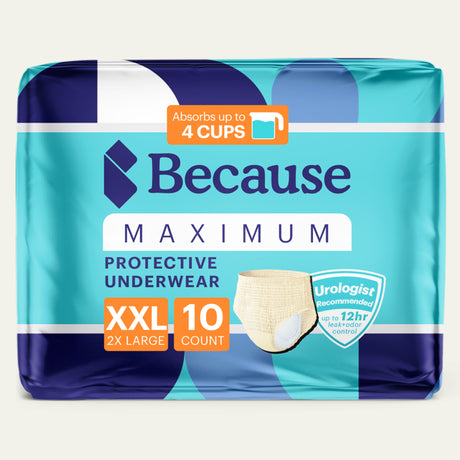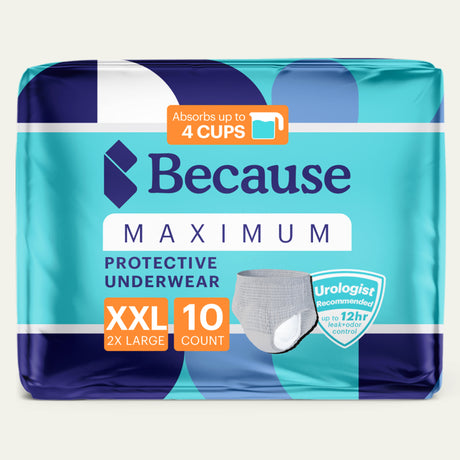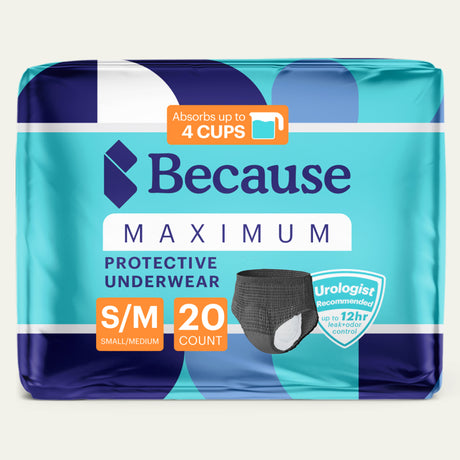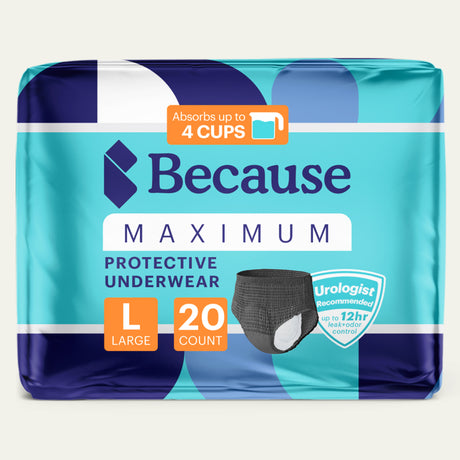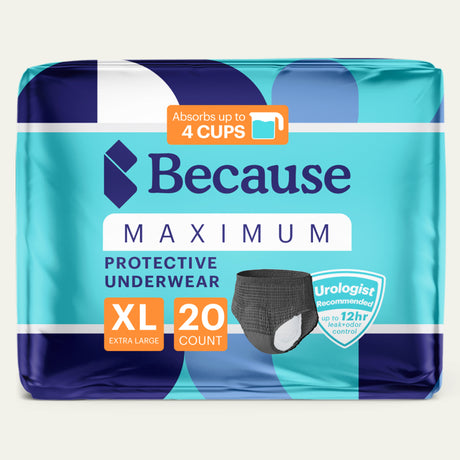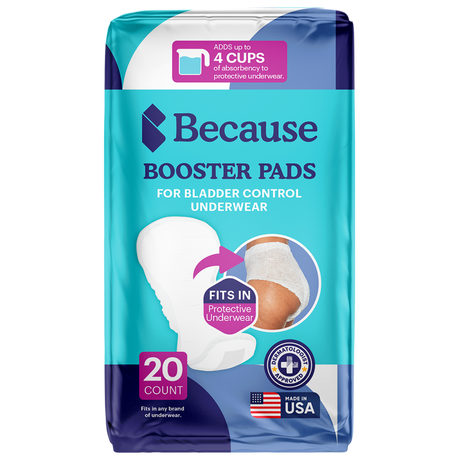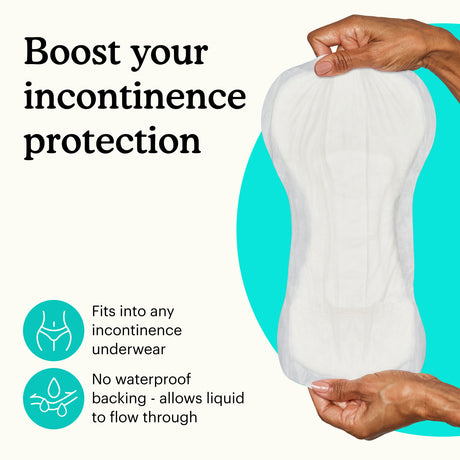IBS can feel like a constant battle against your own body. The unpredictable symptoms, the social anxiety, the emotional toll—it's a lot to handle. But managing IBS doesn't have to be a constant struggle. This guide offers practical, actionable steps to help you understand your IBS, manage your symptoms effectively, and regain control of your life. From dietary modifications and stress management techniques to discreet product solutions and emotional coping strategies, we'll cover everything you need to know to navigate the challenges of IBS with confidence. Because is your partner in this journey, providing resources and products designed to support your well-being and empower you to live comfortably with IBS.
Key Takeaways
- Manage IBS symptoms proactively: Understand your individual triggers, whether dietary, stress-related, or environmental, and develop strategies to minimize their impact. Planning ahead, packing a discreet emergency kit, and making informed dietary choices can significantly improve your comfort and confidence.
- Connect with a supportive community: Talking openly about IBS with trusted friends, family, or support groups can reduce feelings of isolation and embarrassment. Sharing your experiences can foster understanding and create a stronger support network.
- Prioritize self-care and develop a personalized, long-term management plan: Incorporate stress-reducing activities like mindfulness or exercise, prioritize healthy sleep habits, and work with your healthcare provider to create a plan that addresses your specific needs and helps you thrive with IBS.
What is IBS? Symptoms & Daily Life
Irritable bowel syndrome (IBS) is a chronic condition affecting the large intestine. While it's not life-threatening, it can significantly impact your quality of life. Understanding IBS, including its symptoms and how it affects daily routines, is the first step toward effective management. Because recognizes the challenges of living with IBS and offers resources and products to help you navigate these complexities.
Common IBS Symptoms
IBS manifests differently in everyone, but some common symptoms provide clues. Stomach pain or cramps, often worsening after eating and easing after a bowel movement, are typical. Bloating, making your stomach feel full and swollen, is another frequent complaint. Changes in bowel movements are also central to IBS. These can range from diarrhea, with watery stools and sudden urges, to constipation, where you might strain during bowel movements. Sometimes, individuals experience both. These gastrointestinal symptoms can occur individually or in combination.
How IBS Affects Daily Life
IBS isn't just about physical discomfort; it has a ripple effect on daily life. The unpredictable nature of symptoms can make planning difficult and lead to anxiety, especially in social situations. The fear of a sudden flare-up can make it challenging to enjoy social events or even run errands. This can affect your ability to work, travel, and participate in activities you enjoy. The stress and worry associated with IBS can create a cycle, where anxiety exacerbates symptoms, further impacting daily life. Learning to manage these challenges is key to living well with IBS. Finding reliable coping mechanisms and strategies for discreetly managing symptoms can help you regain control and confidence.

Manage IBS in Public: Essential Strategies
Successfully managing IBS symptoms often involves a combination of lifestyle adjustments, dietary changes, and stress management techniques. When you're out and about, a bit of pre-planning can significantly reduce anxiety and help you feel more confident.
Plan Ahead: Find Restrooms
Before heading out, especially to unfamiliar places, take a few minutes to locate nearby restrooms. Scope out restaurants, stores, or other public spaces along your route. Knowing where restrooms are can ease anxiety and help you feel more prepared. If you're attending a social event, like a concert or wedding, check out the venue's layout online beforehand or discreetly ask a staff member upon arrival. This simple step can make a big difference in your comfort level. Thinking ahead about potential food choices is also helpful. If you're unsure about restaurant options, consider having a small meal beforehand to avoid triggering your symptoms.
Control Symptoms with Diet
Dietary choices play a crucial role in managing IBS. While everyone's triggers are different, common culprits include greasy foods, dairy, caffeine, and certain high-FODMAP fruits and vegetables. If you're going to a social gathering where food is served, bring a dish you know you can tolerate. This ensures you'll have something safe to eat and minimizes the risk of unexpected reactions. Packing your own snacks, like nuts, seeds, or fruit (if tolerated), can also help you avoid trigger foods while on the go. Remember to stay hydrated by carrying a water bottle and sipping water throughout the day.
Pack an Emergency Kit
An emergency kit can be a lifesaver when dealing with IBS in public. Pack a small bag with essentials like a change of underwear, incontinence pads or liners, wet wipes, and a small plastic bag for disposal. Having these items on hand can provide peace of mind and help you manage any unexpected accidents discreetly. Being prepared can significantly reduce stress and anxiety associated with IBS. Consider adding pain relievers, anti-diarrheal medication (if appropriate for your IBS type), and a small bottle of hand sanitizer to your kit. Comfortable pants or leggings can also be helpful if you experience bloating or discomfort.
Manage Accidents Discreetly
Life with irritable bowel syndrome (IBS) can be unpredictable. Even with careful planning, occasional accidents might happen. Don't let this discourage you. Being prepared can significantly reduce stress and anxiety, allowing you to confidently navigate social situations and daily life. One helpful strategy is to create a small, discreet kit to keep with you. Include essentials like a change of underwear, wet wipes, toilet paper, and hand sanitizer. Having these items readily available can provide peace of mind and help you manage any unexpected situations with greater ease. Consider adding a small, disposable odor-neutralizing bags to your kit so carry any soiled products until you can dispose of them properly. Planning ahead also extends to your wardrobe. Choose clothing that offers a little extra coverage or camouflaging, like darker colors or patterns. This can help minimize any visible signs of an accident and further boost your confidence. Finally, identify safe spaces in advance. Knowing where accessible restrooms are located can alleviate anxiety and provide a sense of control.
Cope with Public Reactions
While managing the physical aspects of an accident is important, navigating the social aspect can be equally challenging. Remember, most people are understanding and empathetic, even if they don't fully grasp the realities of living with IBS. If an accident does occur in a public setting, try to stay calm. Excuse yourself discreetly and attend to your needs in a restroom or other private area. If someone does happen to notice, a simple explanation like "I'm not feeling well" is usually sufficient. You don't owe anyone a detailed explanation of your medical condition.

Choose Protective Products: Comfort & Security
Living with IBS can be unpredictable, but choosing the right protective products can offer significant peace of mind. This section will guide you through available options and how to select what works best for you.
Available Protective Products
Several products can help manage IBS symptoms, from mild leaks to more significant accidents. Disposable absorbent underwear, designed for comfort and discretion, is available in various absorbencies. For lighter protection, consider bladder control pads or liners, which fit inside your own underwear. These are ideal for managing occasional leaks and can be easily changed as needed. Many people find that carrying fecal incontinence products provides extra security, especially during times of heightened anxiety or when access to a restroom is limited. Keeping disposable incontinence wipes or cleansing spray and hand sanitizer in your bag ensures you can freshen up quickly and discreetly if needed. Building your personal IBS survival kit with these essentials can significantly reduce stress and boost confidence.
Selecting the Right Protection
Finding the right level of protection depends on your individual needs and the severity of your symptoms. Start by considering your typical IBS experiences. Do you experience occasional, small leaks, or more frequent, larger accidents? The absorbency level you need directly relates to this. For mild leaks, liners or light pads may suffice. For more substantial accidents, consider maximum to heavy absorbency underwear or pads. Comfort is also key. Look for products made with breathable materials that fit discreetly under your clothing. Don't hesitate to try different brands and styles to find what feels best against your skin and provides the most secure fit. Because offers a range of products with varying absorbencies, allowing you to find the perfect fit for your needs. Remember, finding the right product might take some experimentation, so be patient with yourself during this process.
Cope with IBS Emotionally: Embarrassment & Anxiety
Living with irritable bowel syndrome (IBS) isn't just about managing physical symptoms; it's also about navigating the emotional challenges that often accompany the condition. It's completely normal to feel embarrassed, anxious, or even isolated because of your IBS. This section offers practical advice and compassionate support to help you cope.
Psychological Effects of IBS
IBS is more than just occasional digestive upset. It's classified as a disorder of gut-brain interaction (DGBI), meaning there's a powerful connection between your gut and your brain. This connection significantly impacts not only your physical well-being but also your emotional and even occupational life. Factors like early life stress, poor sleep, and unhealthy coping mechanisms can disrupt this communication, increasing the likelihood of developing IBS or worsening existing symptoms. Understanding this mind-body connection is the first step toward feeling more in control.
Manage Social Anxiety & Isolation
Social situations can be particularly stressful when you're dealing with IBS. The anticipation of an event, coupled with the fear of an IBS flare-up, can detract from the enjoyment. But it doesn't have to be this way. Planning ahead can make a real difference. Before heading out, locate restrooms in advance. Packing an emergency kit with essentials like a change of underwear and Because Extra Large Incontinence Cleansing Wipes allow an easy, gentle clean on-the-go. Being prepared can significantly reduce anxiety and help you feel more confident in social settings.

Talk About IBS: Friends & Family
Opening up about a health condition can feel vulnerable, but talking about irritable bowel syndrome (IBS) with close friends and family can make a real difference. It can lighten your emotional burden and help you build a supportive network. It might feel awkward at first, but clear communication can lead to greater understanding and make managing IBS in social situations much easier.
Start the Conversation
Starting the conversation about your IBS doesn't have to be a big production. Ease into it by mentioning your symptoms when they affect your plans, like needing to adjust dinner reservations or finding a restroom. For example, you could say, "I'm so glad we're going out tonight, but could we choose a restaurant with easy restroom access? I've been having some digestive issues lately." This opens the door for further discussion without feeling overwhelming. As the FODMAP Consultancy points out, open communication about IBS can be surprisingly relatable, and you might find others share similar experiences.
Educate Others About IBS
Once you've started the conversation, take the opportunity to educate your friends and family about IBS. Many people have misconceptions about the condition, so sharing accurate information can help them understand what you're experiencing. Explain that IBS isn't just a "sensitive stomach," but a chronic condition affecting your digestive system. Gutivate emphasizes how empowering it can be to share your experiences, enabling loved ones to offer support and make helpful accommodations.
Set Boundaries & Express Needs
Finally, be clear about your needs and set boundaries. This might involve explaining dietary restrictions or needing to take breaks during social events. Mindset Health offers practical advice on communicating dietary needs, suggesting you clearly explain how certain foods might trigger your symptoms. Don't be afraid to ask for what you need, whether it's adjusting meal plans or finding a quiet space to rest. Empowering your loved ones with this knowledge allows them to support you effectively and helps you feel more comfortable and confident navigating social situations.
Enjoy Social Events with IBS
Living with IBS doesn't mean you have to miss out on social events. With a little planning, you can confidently navigate social situations and enjoy time with friends and family. It's all about understanding your triggers and having strategies in place to manage your symptoms.
Choose IBS-Friendly Activities
Think about activities that offer flexibility and minimize potential stressors. Instead of a multi-course meal at a fancy restaurant, perhaps suggest a picnic in the park where you have more control over the food. A relaxed walk with a friend can be more enjoyable than a crowded concert. Consider a matinee movie instead of a late-night show to avoid disrupting your sleep. Choosing activities that align with your comfort level will help you relax and enjoy the experience.
Dining Out & Parties with IBS
Dining out with IBS can be tricky, but it's definitely manageable. Look at the menu beforehand and identify dishes that are likely to be low-FODMAP or generally easy on your digestion. Don't be afraid to ask the server about ingredients or modifications. If you're attending a potluck or party, consider bringing a dish you know you can tolerate. This ensures you'll have at least one safe food option. This article on avoiding IBS triggers offers additional advice. Remember, communication is key. Letting your host know about your dietary needs can help them create a more inclusive and comfortable environment for you.

Practice Self-Care for IBS
Living with IBS can be challenging, but prioritizing self-care can significantly improve your quality of life. Think of self-care as an essential part of your IBS management plan, not a luxury. It's about understanding your body's needs and developing coping mechanisms to navigate the ups and downs of this condition.
Mindfulness & Relaxation
Stress can worsen IBS symptoms, so finding ways to relax is crucial. Deep, slow breathing exercises can help calm your nervous system and ease discomfort. Mindfulness practices, like meditation, can also help you focus on the present moment and reduce anxiety surrounding your symptoms. Even a few minutes of mindful breathing each day can make a difference. If you're new to mindfulness, explore guided meditation apps or online resources. Remember, managing anxiety—in public or anywhere—is a skill you can develop with practice. While anxiety may not disappear entirely, learning effective management strategies can help you feel more secure and in control.
CBT for IBS
Cognitive Behavioral Therapy (CBT) offers a structured approach to managing IBS. It helps you identify and modify negative thought patterns and behaviors that contribute to your symptoms. Research supports the effectiveness of CBT for IBS. One study showed a positive response in a significant number of IBS patients within just four weeks of CBT treatment. Another study highlighted the benefits of a comprehensive self-management program incorporating CBT alongside education, dietary changes, and relaxation techniques. If you're considering CBT, talk to your doctor or a mental health professional specializing in IBS.
Stay Hydrated & Healthy
Supporting your overall well-being is essential for managing IBS. The Mayo Clinic emphasizes the importance of lifestyle changes for controlling mild IBS symptoms. This includes regular exercise, proper hydration, and adequate sleep. Staying hydrated is particularly important for regulating digestion and preventing constipation, a common IBS symptom. Aim for at least eight glasses of water a day and consider incorporating hydrating foods like fruits and vegetables into your diet. Regular physical activity can also help reduce stress and improve bowel function. Prioritizing sleep allows your body to rest and repair, which can positively impact your overall health and IBS management.
Build a Supportive Environment: Resources & Community
Living with IBS can feel isolating, but remember you're not alone. Millions of people experience similar challenges, and connecting with others can make a world of difference. Building a supportive environment, both online and offline, is key to managing IBS effectively. This means finding reliable resources, connecting with a community, and creating a strong support network.
Find Support Groups
Sharing your experiences with others who understand what you're going through can be incredibly validating and empowering. Online and in-person support groups offer safe spaces to discuss symptoms, share coping strategies, and connect with people who truly get it. These groups can reduce feelings of isolation and provide practical advice for navigating daily life with IBS. Open communication about IBS is important, and support groups offer the perfect platform for these conversations. They can also be a great resource for finding local healthcare professionals specializing in IBS.
Use Digital Health Tools
Technology can be a powerful ally in managing IBS. Numerous apps and online resources offer tools for tracking symptoms, managing dietary changes, and learning relaxation techniques. These digital tools can help you identify triggers, monitor your progress, and stay motivated with your management plan. Some apps even offer personalized guidance based on your specific symptoms and needs. Exploring these resources can empower you to take control of your IBS and make informed decisions about your health.
Thrive with IBS: Long-Term Strategies
Living with IBS is a marathon, not a sprint. It's about finding what works for you and adjusting your approach over time. These long-term strategies can help you not just manage IBS, but truly thrive.
Create an IBS Management Plan
Think of managing IBS like training for a marathon—consistency is key. A well-rounded plan incorporates several elements. Start by working with your doctor to identify your IBS triggers. Common culprits include certain foods, stress, and lack of sleep. Once you pinpoint your triggers, you can start to build a plan to minimize their impact. This might involve dietary changes like following a low FODMAP diet, incorporating stress-reducing activities like yoga or meditation, and prioritizing regular exercise and sufficient sleep, just as the Mayo Clinic suggests. A comprehensive approach, as highlighted in research on IBS management, combines education about your condition, dietary adjustments, relaxation techniques, and even cognitive-behavioral strategies. Remember, managing stress is a crucial part of managing IBS.
Related Articles
- IBS and Overactive Bladder: Can IBS Cause Incontinence?
- Supportive Online Spaces for Incontinence Discussions
- What Type of Bowel Incontinence Products Do I Need?
- Managing Bowel Incontinence After Gallbladder Surgery
Frequently Asked Questions About Managing IBS
Is IBS a serious condition?
IBS, while not life-threatening, can significantly impact your daily life. It's a chronic condition requiring ongoing management, but with the right strategies, you can absolutely live well with IBS. It's important to talk to your doctor for personalized guidance and support.
What are the first steps to take if I think I have IBS?
If you suspect you have IBS, schedule an appointment with your doctor. They can accurately diagnose your condition and rule out other potential issues. Keeping a food and symptom diary can be incredibly helpful for identifying patterns and potential triggers. Note down what you eat, when you experience symptoms, and their severity. This information will be valuable for your doctor and can help guide your management plan.
How can I manage IBS flare-ups in public?
Planning ahead is key. Locate restrooms in advance, pack a small kit with essentials like a change of underwear and Because Incontinence Wipes, and consider bringing your own snacks if you're unsure about food options. Having a plan can significantly reduce anxiety and help you feel more confident.
What kind of products can help me manage IBS?
Several products offer discreet and effective management of IBS symptoms. Choosing the right product depends on your individual needs and preferences.
I feel embarrassed about my IBS. What can I do?
It's completely normal to feel embarrassed about IBS, but remember you're not alone. Talking to trusted friends, family, or a therapist can help you process these feelings and build a supportive network. Connecting with others who understand what you're going through can make a world of difference. Consider joining an online or in-person support group for IBS.
Sources:
Biio. (n.d.). Navigating social situations with IBS: Tips and tricks. Retrieved November 15, 2024, from https://www.biio.com.au/post/navigating-social-situations-with-ibs-tips-and-tricks
Pauley, J. (2024, October 16). How to avoid IBS triggers at social events. Gut Talk™. Retrieved November 15, 2024, from https://www.guttalk.com/how-to-avoid-ibs-triggers-at-social-events/
Thomas, D. (n.d.). Navigating social situations with IBS. FODMAP Consultancy. Retrieved November 15, 2024, from https://www.fodmapconsultancy.com/navigating-social-situations-with-ibs/
Judge, E. (2024, April 17). How to talk to your family about IBS. Gutivate. Retrieved November 15, 2024, from https://gutivate.com/blog/talk-to-family-about-ibs
Hancock, A. (2021, January 20). Bathroom banter: How to talk about having IBS. Mindset Health. Retrieved November 15, 2024, from https://www.mindsethealth.com/matter/talking-about-ibs
American Gastroenterological Association. (2010, April 27). Cognitive behavior therapy may rapidly relieve severe irritable bowel syndrome (IBS) symptoms. ScienceDaily. Retrieved November 15, 2024 from www.sciencedaily.com/releases/2010/04/100427070846.htm
Zia, J. K., Barney, P., Cain, K. C., Jarrett, M. E., & Heitkemper, M. M. (2016). A Comprehensive Self-Management Irritable Bowel Syndrome Program Produces Sustainable Changes in Behavior After 1 Year. Clinical gastroenterology and hepatology : the official clinical practice journal of the American Gastroenterological Association, 14(2), 212–9.e92. https://doi.org/10.1016/j.cgh.2015.09.027
Mayo Clinic Staff. (2023, August 26). Exercise: 7 benefits of regular physical activity. Mayo Clinic. Retrieved November 15, 2024, from https://www.mayoclinic.org/healthy-lifestyle/fitness/in-depth/exercise/art-20048389
Suni, E. (2024, March 4). Mastering sleep hygiene: Your path to quality sleep. Sleep Foundation. Retrieved November 15, 2024, from https://www.sleepfoundation.org/sleep-hygiene
D’Silva, A., Hua, N., Modayil, M.V. et al. (2024, July 19). Digital Health Interventions Are Effective for Irritable Bowel Syndrome Self-Management: A Systematic Review. Dig Dis Sci (2024). https://doi.org/10.1007/s10620-024-08672-7
Monash University. (n.d.). The 3-step FODMAP diet [PDF]. Retrieved November 15, 2024, from https://monashfodmap.com/documents/16/3-step_FODMAP_Diet_A4_info_sheet.pdf?_gl=1hg2lwx_gcl_au*MTIxMTMxMzE5Ny4xNzMxNjg2MjI5


